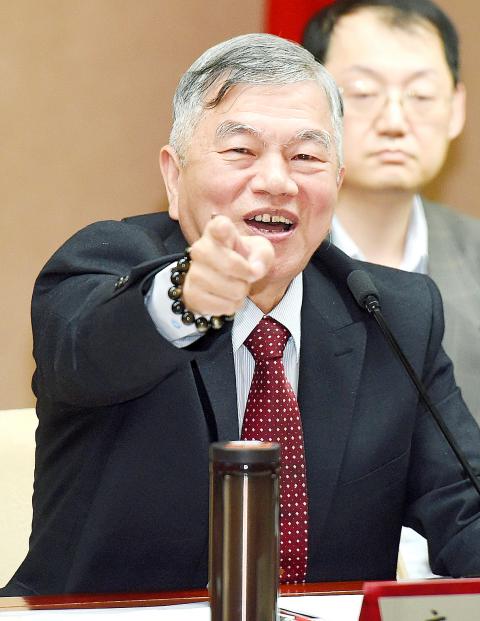The Ministry of Economic Affairs yesterday published a revised national energy strategy that calls for the abolition of nuclear power by 2025 and reductions in the use of fossil fuels.
Although Taiwanese in November last year voted against the government’s 2025 deadline to abolish nuclear power, the energy source would still be completely removed from the nation’s energy mix after that year due to inevitable constraints, Minister of Economic Affairs Shen Jong-chin (沈榮津) told a news conference in Taipei.
Resistance from local governments, difficulty in procuring replacement parts for aging reactors, finding storage space for spent fuel rods and the inability to complete the stay-of-decommissioning application process have all but ruled out the use of nuclear power beyond 2025, Shen said.

Photo: Huang Yao-cheng, Taipei Times
Other remedies, such as reactivating decommissioned nuclear plants, are also unlikely due to the lengthy budget approval process at the legislature, Shen said, adding that General Electric Co is no longer able to provide technical support for reactors that were installed decades ago.
As for referendum No. 7, which called for the reduction of thermal power by at least 1 percent per year on average, Shen said that the goal is achievable this year and next year.
Achieving the goal would not increase the risk of energy shortages and 15 percent reserved power generation capacity could be maintained, he said.
However, energy shortages could happen in 2021 due to an anticipated rise in consumption, Shen said.
Major expansions by Taiwan Semiconductor Manufacturing Co (台積電), Powerchip Technology Corp (力晶科技) and Winbond Electronics Corp (華邦電), as well as the continued adoption of electric vehicles and the return of Taiwanese manufacturing companies, would raise consumption by an additional 2 billion kilowatt-hours, he said.
“In light of rising demand, it is becoming increasingly difficult to cut the use of fossil fuels at a pace of 1 percent a year based on 2017 levels,” Shen said.
He urged the public to support the government’s drive toward renewable energy sources.
However, the government would fulfill the referendum’s requirement barring capacity expansions at coal-fired power plants and abide by local governments’ tightened environmental regulations and limits on coal use, Deputy Minister of Economic Affairs Tseng Wen-sheng (曾文生) said.
Fossil-fuel power generation uses coal and natural gas, Tseng said, adding that the government would continue to lower dependence on dirtier coal plants in favor of cleaner-burning gas plants.
Coal-fired power would trend down, but it would take more time to determine its proportion in the nation’s energy mix, Tseng added.

INVESTIGATION: The case is the latest instance of a DPP figure being implicated in an espionage network accused of allegedly leaking information to Chinese intelligence Democratic Progressive Party (DPP) member Ho Jen-chieh (何仁傑) was detained and held incommunicado yesterday on suspicion of spying for China during his tenure as assistant to then-minister of foreign affairs Joseph Wu (吳釗燮). The Taipei District Prosecutors’ Office said Ho was implicated during its investigation into alleged spying activities by former Presidential Office consultant Wu Shang-yu (吳尚雨). Prosecutors said there is reason to believe Ho breached the National Security Act (國家安全法) by leaking classified Ministry of Foreign Affairs information to Chinese intelligence. Following interrogation, prosecutors petitioned the Taipei District Court to detain Ho, citing concerns over potential collusion or tampering of evidence. The

NEGOTIATIONS: Taiwan has good relations with Washington and the outlook for the negotiations looks promising, Minister of Economic Affairs J.W. Kuo said Taiwan’s GDP growth this year is expected to decrease by 0.43 to 1.61 percentage points due to the effects of US tariffs, National Development Council (NDC) Minister Paul Liu (劉鏡清) said at a meeting of the legislature’s Economics Committee in Taipei yesterday, citing a preliminary estimate by a private research institution. Taiwan’s economy would be significantly affected by the 32 percent “reciprocal” tariffs slapped by the US, which took effect yesterday, Liu said, adding that GDP growth could fall below 3 percent and potentially even dip below 2 percent to 1.53 percent this year. The council has commissioned another institution

NEGOTIATIONS: The US response to the countermeasures and plans Taiwan presented has been positive, including boosting procurement and investment, the president said Taiwan is included in the first group for trade negotiations with the US, President William Lai (賴清德) said yesterday, as he seeks to shield Taiwanese exporters from a 32 percent tariff. In Washington, US Trade Representative Jamieson Greer said in an interview on Fox News on Thursday that he would speak to his Taiwanese and Israeli counterparts yesterday about tariffs after holding a long discussion with the Vietnamese earlier. US President Donald Trump on Wednesday postponed punishing levies on multiple trade partners, including Taiwan, for three months after trillions of US dollars were wiped off global markets. He has maintained a 10 percent

TRADE: The premier pledged safeguards on ‘Made in Taiwan’ labeling, anti-dumping measures and stricter export controls to strengthen its position in trade talks Products labeled “made in Taiwan” must be genuinely made in Taiwan, Premier Cho Jung-tai (卓榮泰) said yesterday, vowing to enforce strict safeguards against “origin laundering” and initiate anti-dumping investigations to prevent China dumping its products in Taiwan. Cho made the remarks in a discussion session with representatives from industries in Kaohsiung. In response to the US government’s recent announcement of “reciprocal” tariffs on its trading partners, President William Lai (賴清德) and Cho last week began a series of consultations with industry leaders nationwide to gather feedback and address concerns. Taiwanese and US officials held a videoconference on Friday evening to discuss the